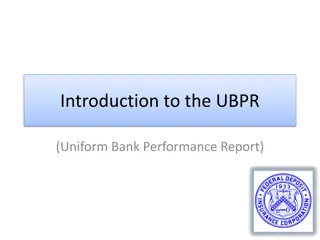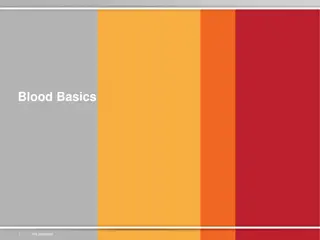Transfusion
Blood transfusion is a crucial medical procedure worldwide, with various components like packed red blood cells, plasma, platelets, and cryoprecipitate being utilized for efficient use. Differential centrifugation is employed for component preparation, ensuring precise separation of red blood cells,
2 views • 45 slides
Differential white blood cell count
Differential white blood cell count, also known as a leukocyte count, is a crucial test to determine the different types of white blood cells present in the blood. The cells are classified into granulocytes (neutrophils, eosinophils, basophils) and agranulocytes (lymphocytes, monocytes). Blood smear
3 views • 21 slides
Understanding Human Blood Groups and Genetics
Human blood groups are determined by the presence or absence of specific antigens and antibodies. The ABO system categorizes blood into four types (A, B, AB, O), while the Rh factor (D antigen) determines whether blood is RhD positive or negative. Blood group antigens are crucial for safe transfusio
2 views • 14 slides
Understanding How Diabetes Affects Blood Vessels
Diabetes can harm blood vessels, leading to complications due to high blood sugar levels. Hemoglobin A1c plays a crucial role in monitoring glucose control, with values above 6.5% indicating diabetes. Over time, high blood sugars can damage blood vessels, affecting blood flow and increasing the risk
1 views • 19 slides
Understanding Red Blood Cell (RBC) Count and Its Significance in Blood Health
Red blood cells, comprising nearly 45% of blood volume, play a crucial role in oxygen transport. The red blood cell count, measured as the number of cells per unit volume of blood, helps assess the adequacy of oxygen-carrying capacity. Normal values vary by age and gender. The experiment aims to det
8 views • 16 slides
Bank of India
Bank of India (BOI), established in 1906, is a vulnerable and important public sector bank in India that plays a vital role in the nation\u2019s economic growth. With a widespread network of branches and a global presence, BOI offers a diverse range of banking and financial services, embracing digit
3 views • 5 slides
State Bank of India
State Bank of India (SBI) is one of the largest and pioneer public sector banks in India. It was established in 1806 as the Bank of Calcutta, making it one of the oldest commercial banks in the Indian subcontinent. It later merged with the Bank of Bombay and the Bank of Madras in 1921 to form the Im
4 views • 5 slides
Bank of Maharashtra
Bank of Maharashtra(BOM), which was founded in 1935 and is based in Pune, India, operates as a well-known government-owned bank with branches throughout the country. The bank offers various banking services, including digital options for customer convenience. It actively dedicates itself to assistin
1 views • 5 slides
Canara Bank - Probationary Officer recruitment process
Canara Bank is one of the prominent public sector banks in India. Established in 1906. It has a significant presence in the Indian Banking and financial sector. Canara Bank provides a wide range of banking and financial services to its customers, including savings and current accounts, loans, credit
1 views • 5 slides
Union Bank of India
Union Bank of India was established on November 11, 1919, as a limited company with its headquarters located in Mumbai. Union Bank of India stands as a prominent public sector bank, with 76.99 percent of its total share capital held by the Government of India.\nOrganisation of Union Bank of India\nU
1 views • 5 slides
Punjab and SInd Bank
]Punjab and Sind Bank was founded in 1908 and headquartered in New Delhi, is a government-owned bank primarily serving in northern India, especially Punjab. It offers a range of banking services, has a social focus, and actively participates in financial inclusion initiatives.\nOrganization of Punja
2 views • 5 slides
Understanding the Components of Blood for Better Health
Explore the main components of blood such as red blood cells, white blood cells, platelets, and plasma. Learn how these components function, their percentages in blood, and how they impact human health. Discover the importance of blood donation and how changes in blood composition can affect overall
2 views • 19 slides
Understanding Blood Groups and Their Significance
Human blood types are determined by specific antigens and antibodies present on red blood cells, influencing crucial aspects like blood transfusions and familial relationships in forensic medicine. The ABO system, with its four main blood types (A, B, AB, O), plays a vital role in categorizing blood
7 views • 14 slides
How to Resolve QuickBooks Bank Feed Issues_ A Comprehensive Guide
Resolve QuickBooks Bank Feed issues effortlessly with our expert guide. Learn step-by-step solutions to tackle common problems such as missing transactions, connection errors, and incorrect data imports. Whether you're using QuickBooks Desktop or Online, our comprehensive resource covers everything
2 views • 4 slides
Understanding the Uniform Bank Performance Report (UBPR)
The Uniform Bank Performance Report (UBPR) is a crucial tool used by regulatory agencies, the public, and bank management to evaluate a bank's performance in areas such as capital, asset quality, earnings, liquidity, and market risk sensitivity. This report provides detailed data on a bank's financi
1 views • 24 slides
Understanding Blood Cells and Transport Mechanisms
Your blood, consisting of red blood cells, white blood cells, platelets, and plasma, plays a crucial role in transporting substances like oxygen, nutrients, and waste products throughout your body. Red blood cells are specialized for oxygen transport due to their unique adaptations, while white bloo
2 views • 18 slides
Achieving 100% Voluntary Non-Remunerated Blood Donation in Oman
In the Sultanate of Oman, the Department of Blood Services has successfully moved towards 100% Voluntary Non-Remunerated Blood Donation (VNRBD), focusing on motivating the public to donate blood regularly. This shift has led to a significant increase in blood donations from 2007 to 2011, with a grow
1 views • 26 slides
Banking Regulations in Bangladesh: A Comprehensive Overview
The Bangladesh Bank Order of 1972 established the central bank, Bangladesh Bank, which regulates banking activities under the Bank Companies Act of 1991. This legislation, along with the Financial Institutions Act of 1993, sets the framework for overseeing bank companies and non-banking financial in
2 views • 27 slides
Biochemistry of Blood Practical Course Overview
This biochemistry of blood practical course involves various experiments focusing on blood components such as plasma, serum, proteins, enzymes, blood groups, hemoglobin, glucose levels, and more. The course outline includes detailed experiments, marking distribution, guidelines for writing scientifi
3 views • 6 slides
Overview of Deendayal Antyodaya Yojana National Rural Livelihoods Mission
Deendayal Antyodaya Yojana is a national rural livelihoods mission under the Ministry of Rural Development, Government of India. It focuses on Self-Help Group (SHG) Bank Linkage and Interest Subvention to support rural development. The NRLM SHG Bank Linkage Portal facilitates the monitoring of SHG B
2 views • 39 slides
Understanding White Blood Cell Count and Measurement Methods
White blood cell count measures the number of white blood cells in a specific volume of blood, indicating infection or disease progression. The normal range is 5000-11000 cells/cubic mm, varying with age. Methods include manual and electronic counting using specific instruments. Materials like antic
0 views • 14 slides
Presentation of South African Reserve Bank Amendment Bill to Joint Committee
The Economic Freedom Fighters (EFF) presented the South African Reserve Bank Amendment Bill to amend the current ownership structure allowing private individuals, including foreigners, to own shares in the South African Reserve Bank. The presentation emphasizes the need for legislative actions withi
0 views • 19 slides
Understanding ABO Blood Grouping and Rh Groups
ABO blood grouping and Rh factor testing are crucial for blood transfusions and forensic medicine. The presence or absence of specific antigens and antibodies in human blood determines blood type. Genetic inheritance from parents establishes blood type, with codominance influencing offspring phenoty
0 views • 13 slides
Understanding Blood Components and Their Administration
Effective blood transfusion therapy relies on the availability and proper administration of various blood components. Separating blood components allows for better patient care by matching transfusions to individual needs and avoiding unnecessary components. Different blood products like packed red
1 views • 27 slides
Experienced Bank Executives in Wisconsin
Mr. Spitz and Mr. Fink are experienced bank executives in Wisconsin with extensive backgrounds in the banking industry. Mr. Spitz, the Founder & CEO of Settlers Bank, has over 30 years of experience ranging from community banking to corporate commercial lending. He is actively involved in his commun
0 views • 7 slides
Understanding Blood Pressure Monitoring
Blood pressure monitoring is essential for maintaining overall health. This article explores the significance of blood pressure, the importance of monitoring it, and the methods used to measure blood pressure. It also delves into the clinical need for accurate blood pressure monitoring devices and t
0 views • 22 slides
Versiti Blood Center of Illinois: Community Impact through Blood Drives
Versiti Blood Center of Illinois, a nonprofit organization, plays a vital role in healthcare by organizing blood drives to ensure a sufficient supply of blood for hospitals in the Chicagoland and Northwest Indiana area. Through employee engagement, community outreach, and raising awareness about the
0 views • 10 slides
Overview of Reserve Bank of India Functions and Responsibilities
The Reserve Bank of India serves as the central bank in India, responsible for functions such as issuing bank notes, acting as banker to the government, and serving as the banker's bank. It manages currency chests, handles government finances, and ensures the stability and soundness of the banking s
0 views • 15 slides
Blood Types and Personality Traits - Insights into Behavior and Character
Blood types O, A, and B are associated with specific personality traits and behaviors. Those with blood type O are characterized by confidence, honesty, and optimism. Blood type A individuals tend to be perfectionists, sensitive, and pessimistic. Blood type B individuals are creative, expressive, an
0 views • 10 slides
Challenges in Managing O- Red Cell Component Blood Supply
Addressing the challenges of managing O- red cell component blood supply involves considerations such as compatibility rules, absolute and relative indications, EBA benchmark comparisons, data monitoring, case studies, D variant specifications, and recommendations for transfusions. The supply side c
0 views • 39 slides
Understanding Complete Blood Count (CBC) Test
Complete Blood Count (CBC) is a panel of tests that evaluates different types of blood cells, including red blood cells, white blood cells, and platelets. CBC helps diagnose various blood disorders and monitor conditions that affect blood cells, such as anemia or infections. The test is ordered base
0 views • 20 slides
Understanding the Basics of Blood and Transfusions
Blood is a vital tissue that performs essential functions like delivering oxygen and nutrients, maintaining immunity, and controlling body temperature. Blood transfusions save lives by treating accident victims, transplant recipients, cancer patients, and those with blood-related diseases. Component
0 views • 20 slides
Blood Transfusion in Surgery: Types and Indications
Blood transfusion plays a crucial role in surgery, with different blood products such as whole blood, packed red cells, fresh-frozen plasma, cryoprecipitate, and platelets being used based on specific needs. Understanding the indications and proper handling of blood products is essential for safe tr
0 views • 13 slides
Overview of Blood and Hematology: Functions and Composition
The human body consists mostly of water, with blood making up approximately 8% of body weight. Blood is composed of plasma and formed elements, including red blood cells (erythrocytes), white blood cells (leukocytes), and platelets. Plasma, the liquid part of blood, contains various proteins such as
0 views • 12 slides
Understanding Blood: Composition and Functions
Blood is a vital fluid tissue in the human body, classified as a connective tissue. It consists of living cells known as formed elements suspended in a non-living matrix called plasma. The physical characteristics of blood, such as color range, pH level, and temperature, play crucial roles in mainta
0 views • 33 slides
Comprehensive Guide to Blood Collection Techniques in Medical Investigations
Blood collection is a crucial process in medical investigations where blood is withdrawn from patients for analysis. Methods include arterial sampling, venipuncture, and fingerstick sampling, each serving specific purposes. Venous blood is preferred over arterial blood due to accessibility and ease
0 views • 10 slides
Rational Use of Blood and Blood Components in Healthcare
Rational use of blood and blood components is crucial in healthcare settings to maximize resources, minimize risks, and enhance patient outcomes. This involves avoiding unnecessary transfusions, understanding the risks associated with transfusions, dispelling misconceptions, and choosing the most ap
0 views • 32 slides
Importance of Verification for Patient Identification & Blood Product Labeling in Medical Procedures
This educational program emphasizes the crucial role of verifying patient identification and blood product labeling in medical settings. It covers the significance of accurate verification, policy expectations, and the process for ensuring patient safety during blood product administration. The prog
1 views • 30 slides
Understanding Blood Group and Cross Matching in Transfusion Medicine
Blood group and cross matching play crucial roles in determining blood compatibility for transfusion. The presence or absence of specific antigens on red blood cells, along with antibody reactions, help identify blood types and ensure safe transfusions. Cross matching involves testing donor and reci
0 views • 8 slides
Understanding Complete Blood Count (CBC) Testing
Complete Blood Count (CBC) is a crucial test that provides information about the composition of a patient's blood, including red blood cells, white blood cells, and platelets. This test helps in diagnosing conditions such as anemia, infections, and more. CBC involves analyzing parameters like RBC co
0 views • 20 slides







































